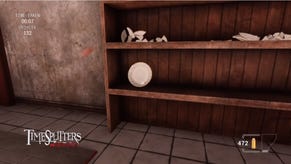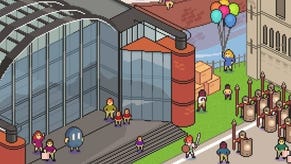TimeSplitters review
Review - first person action on the PlayStation 2 to die for
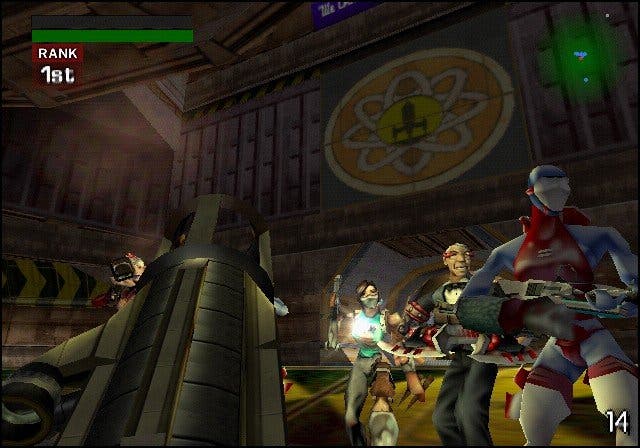
Free as a bird
If SSX is the best game on the PlayStation 2 at launch, then TimeSplitters easily comes in a close second. The game, developed by ex-Goldeneye developers Free Radical, takes advantage of the PS2's increased RAM and ability to deal with floating point calculations and produces a 60fps-smooth single and multiplayer experience that encompasses tremendous fun. It's based on a simple idea, that blasting is fun and that we should all do lots of it. The fast action is sometimes rather repetitive and draining, but it's just... it's just so entertaining. At first, the single player mode didn't appeal to me at all. The multiplayer struck a chord almost immediately (although it does prove exceedingly boring to watch), but the single player experience lacked vitality. For starters, there's no intro movie, it just begins with a simple menu offering single or multiplayer, then Story or Arcade if you opt for the singleplayer option. The "Story" is about as simplistic as something out of a Doom clone from 1995; you travel all over the world over the period of about ten years and retrieve secret artefacts before the TimeSplitters (lots of nasty fellows with a time machine) come along and take over the world. Arcade just lets you pick and choose which level to blast through. We've found that it's best to treat the Story mode rather like that of a beat'em'up. Sure, things aren't terribly well structured and it's not exactly gripping, but as you improve your reactions and weapon skills and beat new levels, new characters, weapons and even other modes of play are revealed. The reward structure is nicely crafted, so you receive a boost and something new when you most need it.
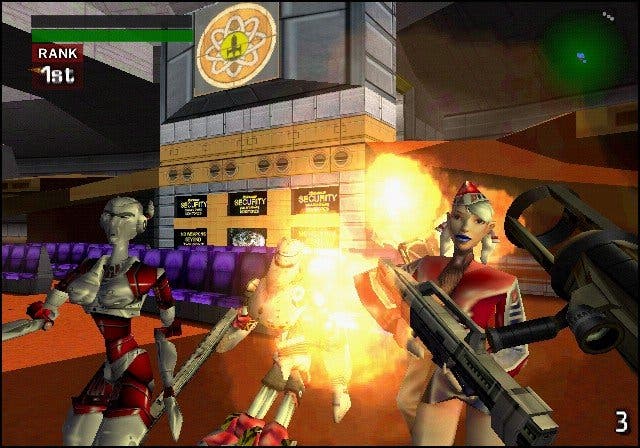
Controlled
Actually, Story mode is a very good preparation for the deathmatch mode, as it teaches you to work quickly and accurately. Accuracy is very important in TimeSplitters, because if you miss once, the chances are you will be hit before you can let off another shot. The auto-aiming of the easy difficulty setting helps to get you used to targeting enemies loosely, and this is where you should start, before progressing to medium and hard, which are incredibly tough. Another option the Story mode offers you is the chance to play through it co-operatively in split-screen with a friend. Learning the levels is quite easy with two of you working in unison because you cover more ground - I can't remember a game since the original Quake that offered quite as exciting co-op. Deathmatch feels a lot like Goldeneye, which is a good thing. The 60fps thing is incredibly important, and even with four players on screen things tend not to drop much lower than you would normally expect. Setting up is simple, with points and time limits, weapon selection, bot selection, two to four players and the style of the level all selected from a simple pre-game menu. There are plenty more things to fiddle around with too, including pre-definable weapon sets (which you can of course load onto and from memory cards) and bot sets. My personal favourite at the moment is a Duke Nukem style collection with sci-fi guns and trip mines.
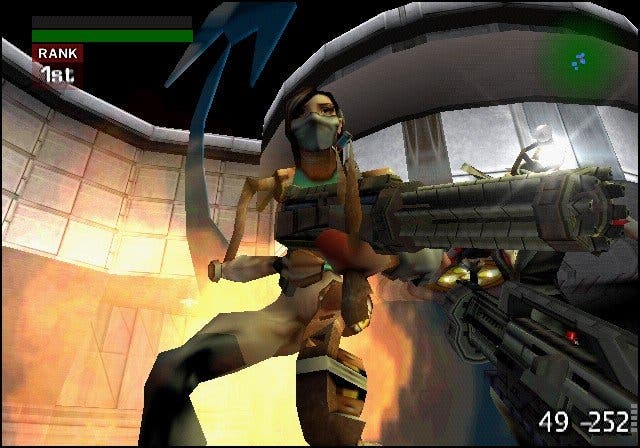
Mapped out
Controlling TimeSplitters is as simple as can be because each player can load and store their own config. The default is perfectly adequate of course, with the left stick controlling the direction you face and how your neck is inclined, and the right stick allowing you to move around, strafe and such. R1 and R2 are primary and secondary fire respectively (secondary is either rapid fire or some other logical option), the D-Pad is for switching weapons and the rest control crouching and other options. Multiplayer games are generally quite hectic, depending on how many people are in the levels. If it's a tight, claustrophobic environment, the bots and yourself end up respawning more often than you ever would have in Goldeneye, and if it's something more open, it can take a while to nail anybody if you don't have a splash damage weapon like TNT or a rocket launcher. The weaponry on the whole is quite evenly spread around the levels (depending of course on what weapon-set you opt for), and the placement of respawns is always well judged. Map design is something the TimeSplitters team can be very proud of, on the whole. The multiplayer maps occasionally seem a bit prefab-heavy, but the single player locations are exemplary, with huge Egyptian sphinxes and other ornate decoration. And it's not just the Free Radicals that can be pleased with the mapping, if you feel like getting involved, there's a very accomplished map editor included to let you do just that. The options it includes allow you to create anything from a Minotaur-style labyrinth to a rooftop shootout scene. The powerful editor is definitely worth spending some time with, and unlike the cumbersome PC map editors for Quake and Unreal, allows you to create impressive maps quickly, using a combination of L-shaped turns, rooms and connectors to create the scenery and things like stairs to add a third dimension. With the choice of tile settings (including Gothic, Sci-fi etc) you can create comfortable and diverse levels. Storing the levels on your memory card isn't as complex or space-filling as you would expect either, and I managed to fit loads of preliminary designs onto one single card.

Looks the part
Elsewhere, TimeSplitters isn't just pretty, it's quite beautiful at times. There are no flickering or silly visual effects to mar the experience, and on the whole the characters are all very sharp too. Their identities are somewhat peculiar (one of them looks like a reject from Interstate 76) and rather bemusing, but they are certainly appropriately distinctive in deathmatch. Other memorables in TimeSplitters include things like the location-specific damage on windows, the way pretty much anything you would expect to be able to smash up in real life can be smashed up here and plenty of larger visual effects later on. The sound effects are key here, and although somewhat tacky at times are definitely a lot less cheesy than Free Radical had claimed they would be. The sounds of guns firing and bullets whinnying through the air hit the spot perfectly, and if you don't feel pumped full of adrenaline by the end of a four player deathmatch, you're doing something wrong. So what is there for TimeSplitters to fear elsewhere in the PS2 lineup? Very little as a matter of fact. Unreal Tournament isn't out over here yet, and even when it is I suspect the two styles of play will differ enough to make them valuable additions to any gamer's collection in the long run.
Conclusion
At the moment, it's the best action game available on the PlayStation 2, and although occasionally quite cheesy and certainly not a patch on the likes of Half-Life in terms of storyline and whatnot, it's a damned fine romp. Well worth your time.



